Ancient Books, Scrolls And Manuscripts Burned By Church And Evil Emperors
A. Sutherland - AncientPages.com - Many of human history's missing pages were wiped out by calamities and evil influential individuals who called themselves "God's consuls" and never hid their despising of books and culture of the ancient world.
"It would be less difficult to reconstruct the unknown history of mankind if the Egyptians, Greeks and Hebrews had not transmitted it in fables and if the Catholics had not Christianized ancient rites and destroyed documents alien to their doctrines.
All of man's past was submerged by the enterprise, which was strangely glorified by the symbol of Saint George and Saint Michael slaying the pagan dragon," wrote R. Charroux in his book "Masters of the World".
Will we ever reconstruct the unknown history of mankind?
To gain access to secret knowledge of our ancestors, we have to search among the countless number of fables and myths transmitted to us by generations of the ancient Egyptians, Hebrews, Greeks.
Most of this knowledge, however, has already been destroyed a long time ago…
We begin with Shih, Huang-ti (c.259-c.210 BC) who was the first Emperor of the Ch'in dynasty and founder of the first Chinese empire that unified the entire country. Shi Huang-ti developed a strong central government and a powerful, merciless army.
He maintained stability primarily through punishment, fear and strict control over people's lives.
Among one of his greatest enemies were philosophical and ethical teachings of Confucius "Master Kung" (551-479 BC). He came in contact with these teachings, magic and alchemy while searching for immortality through whatever means.
He failed in his search.
Shih, Huang-ti did not agree with the teachings of Confucius, especially the significance of education. He burned all the literary work of science and history, art and music.
He buried all the Confucian scholars alive…
A great number of ancient prophetic books were burnt in ancient times.
Among them were also the Sibylline Books ("libri Sibyllini", in Latin) of the priests of god Apollo, one of twelve gods that were especially honored by the ancient Romans. Probably written on palm-leaves, the books remained in the custody of the state and under strict control. The public were not allowed to inspect them. They were often consulted by the Romans for more than a thousand years and carefully stored in a stone chest under ground at the base of the statue of Apollo, in the temple of Jupiter Capitolinus. They were kept under the custody of ten to fifteen officers who guarded them day and night.
Someone decided to destroy these priceless works and succeeded to do it.
The Sibylline Books perished in the burning of the temple and it took place on July 6, 83 BC. Only fragments of them have survived. They were deliberately destroyed. Even their copies were destroyed by Stilicho (ca. 359-408), a high-ranking general and Consul of the Western Roman Empire, at some time, just before his death in the year 408.
The papyri of the Egyptian library of the Temple of Ptah in Memphis were totally destroyed, probably due to the destruction of the building. The same fate suffered 200,000 volumes composed largely of ink-written works in the library of Pergamus in Asia Minor. The city of Carthage, razed by the Romans in a seventeen-day fire in 146 B.C., is said have "possessed a library of half a million volumes" that were reduced to ashes by the brutal Roman wave of destruction in the Middle East..." (R. Noorbergen, "Secrets of the Lost Races")
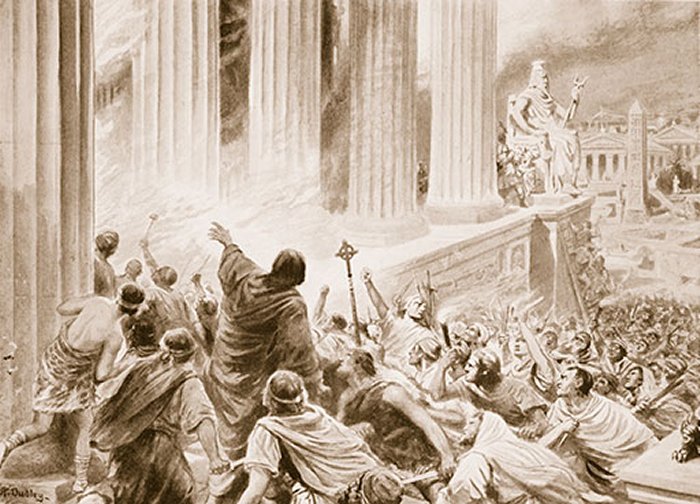
Robert A Dudley, The Burning of the Library at Alexandria in 391 AD, lithograph, c.1910, from Hutchinson's History of the Nations, published United Kingdom, 1910. Photo: Bridgeman Art Library .
The burning of the Library of Alexandria is more or less surrounded by many myths. The library may have suffered several fires or acts of destruction of varying degrees over several years. Both ancient and modern sources suggest possible occasions for the partial or total destruction of the Library of Alexandria. One of those accused for the library's destruction was Julius Caesar during the Egyptian war; this claim was supported in the 4th century both the pagan historian Ammianus Marcellinus and the Christian historian Orosius. However, some others claimed that the flames destroyed only the fleet and some "houses near the sea."
The Alexandrian book depository survived the destruction and continuously flourished. In AD 642, Alexandria was captured by the Muslim army of 'Amr ibn al-'As. According to several later Arabic sources, the library was destroyed by the order of Caliph Omar, who said that "If those books are in agreement with the Quran, we have no need of them; and if these are opposed to the Quran, destroy them," (Bar-Hebraeus in the 13th century work).
This is one version of the story but there many of them.
Later scholars are skeptical of these stories, given the range of time that had passed before they were written down and the political motivations of the various writers.
Books, scrolls and manuscripts have long been the subject of a permanent and almost obsessive hunt. The Inquisition of the Middle Ages reduced the number of manuscripts to nonexistence and Leo the Isaurian (c. 680-740), an Byzantine emperor from 717 until his death in 741, was totally against any devotion to holy images.
He forbade the veneration of icons and burned three hundred thousands manuscripts in Byzantium.
See also:
10 Magnificent Ancient Libraries
In his book "Books on Fire", a French writer and historian, Lucien X. Polastron says that
"Gregory I, prefect of Rome, pope in 590, and future saint (!), ordered the remaining copies of Cicero, Titus-Livy, and many other authors of the great era burned for the sole reason that the young people of the sixth century clearly preferred reading them over the Christian scriptures..."
The Roman Emperor, Diocletian (AD 240 - AD 311) burned the libraries with their Egyptian and Greek documents in the year 296. Another Roman Emperor, Augustus (27 BCE-14 CE) and later a high priest of ancient Roman religion, ordered two thousand "superstitious" books to be burned.
Saint Paul at Ephesus (or Paul the Apostle) was a Hellenistic Jew, who called himself the "Apostle to the Gentiles" was one of the most notable of early Christian missionaries.
This notable man did not like the so called "strange things". He burned all books dealing with the subject.
The lists of all burned literary works and witch-hunting” activities in ancient times are long.
We have just named a few of them.
Written by – A. Sutherland AncientPages.com Staff Writer
Copyright © AncientPages.com All rights reserved. This material may not be published, broadcast, rewritten or redistributed in whole or part without the express written permission of AncientPages.com
Expand for referencesMore From Ancient Pages
-
 Mysterious Unknown Strange-Looking Ancient Seafarers – Survivors Of A Now Vanished Race?
Ancient Mysteries | Oct 11, 2022
Mysterious Unknown Strange-Looking Ancient Seafarers – Survivors Of A Now Vanished Race?
Ancient Mysteries | Oct 11, 2022 -
 Challenging Prehistoric Gender Roles – Women Were Hunters Too – Not Just Men
Archaeology | Oct 21, 2023
Challenging Prehistoric Gender Roles – Women Were Hunters Too – Not Just Men
Archaeology | Oct 21, 2023 -
 1,500-Year-Old Joint Burial Offers A Look Into Attitudes Toward Love And The Afterlife
Archaeology | Sep 14, 2021
1,500-Year-Old Joint Burial Offers A Look Into Attitudes Toward Love And The Afterlife
Archaeology | Sep 14, 2021 -
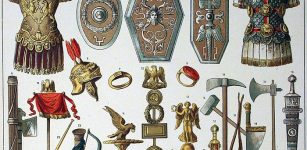 Source Of Ancient Roman Silver Was The Iberian Peninsula
Archaeology | Dec 18, 2021
Source Of Ancient Roman Silver Was The Iberian Peninsula
Archaeology | Dec 18, 2021 -
 Tullus Hostilius: Warrior King Of Rome, Who Succeeded Numa Pompilius And Feared Prophecies
Featured Stories | Mar 6, 2019
Tullus Hostilius: Warrior King Of Rome, Who Succeeded Numa Pompilius And Feared Prophecies
Featured Stories | Mar 6, 2019 -
 Is This The Face of Queen Elizabeth I?
Archaeology | Oct 15, 2018
Is This The Face of Queen Elizabeth I?
Archaeology | Oct 15, 2018 -
 Mysterious Ancient Ruins Of Fortress Discovered In Scottish Highlands
Archaeology | Jan 16, 2018
Mysterious Ancient Ruins Of Fortress Discovered In Scottish Highlands
Archaeology | Jan 16, 2018 -
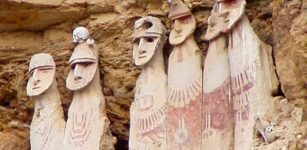 Genetic Evidence Reveals: Chachapoyas “Cloud People” Resistant To Inca Rule
Archaeology | Dec 14, 2017
Genetic Evidence Reveals: Chachapoyas “Cloud People” Resistant To Inca Rule
Archaeology | Dec 14, 2017 -
 Legend: Strange Encounter With The Fairies In The Land Of The Light
Myths & Legends | Oct 14, 2024
Legend: Strange Encounter With The Fairies In The Land Of The Light
Myths & Legends | Oct 14, 2024 -
 The Vinland Map Is A Fake – New Evidence Uncovered By Scientists
Archaeology | Sep 21, 2021
The Vinland Map Is A Fake – New Evidence Uncovered By Scientists
Archaeology | Sep 21, 2021 -
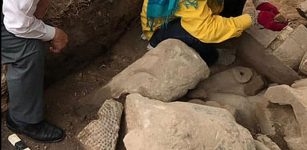 Buddha Statues With Broken Arms, Legs And Without Heads Unearthed In Angkor Wat, Cambodia
Archaeology | Apr 22, 2020
Buddha Statues With Broken Arms, Legs And Without Heads Unearthed In Angkor Wat, Cambodia
Archaeology | Apr 22, 2020 -
 2,550 Submerged Wooden Objects Recovered From The Templo Mayor Of Tenochtitlan
Archaeology | Jun 25, 2022
2,550 Submerged Wooden Objects Recovered From The Templo Mayor Of Tenochtitlan
Archaeology | Jun 25, 2022 -
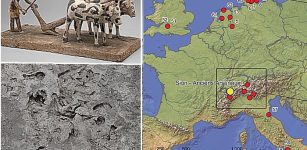 Exciting Find In The Swiss Alps – First Furrows And Animal Tracks Are Evidence Of Prehistoric Plowing
Archaeology | Apr 3, 2024
Exciting Find In The Swiss Alps – First Furrows And Animal Tracks Are Evidence Of Prehistoric Plowing
Archaeology | Apr 3, 2024 -
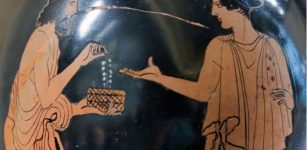 Necklace Of Harmony – Powerful Ill-Fated Piece Of Jewelry With Curse
Featured Stories | Jul 3, 2021
Necklace Of Harmony – Powerful Ill-Fated Piece Of Jewelry With Curse
Featured Stories | Jul 3, 2021 -
 A 900-Year-Old Crusader Sword Discovered Off The HaCarmel Coast, Israel
Archaeology | Oct 20, 2021
A 900-Year-Old Crusader Sword Discovered Off The HaCarmel Coast, Israel
Archaeology | Oct 20, 2021 -
 5 Surprising Things DNA Has Revealed About Our Ancestors
DNA | Sep 27, 2023
5 Surprising Things DNA Has Revealed About Our Ancestors
DNA | Sep 27, 2023 -
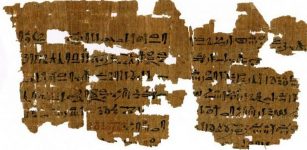 Knowledge Of Ancient Medicine Hidden In Undeciphered Egyptian Manuscripts
Archaeology | Aug 16, 2018
Knowledge Of Ancient Medicine Hidden In Undeciphered Egyptian Manuscripts
Archaeology | Aug 16, 2018 -
 Dragon’s Head – One Of The Most Famous Viking Symbols Discovered At Birka Ancient Excavation Site
Ancient Symbols | May 19, 2015
Dragon’s Head – One Of The Most Famous Viking Symbols Discovered At Birka Ancient Excavation Site
Ancient Symbols | May 19, 2015 -
 Bulgaria’s Aquae Calidae Spa Complex: More 40 Coins Dated To 4th Century CE – Found
Archaeology | Jul 24, 2020
Bulgaria’s Aquae Calidae Spa Complex: More 40 Coins Dated To 4th Century CE – Found
Archaeology | Jul 24, 2020 -
 Pandavleni Buddhist Caves: Sculptures, Inscriptions And Sophisticated Water Management System
Civilizations | Dec 8, 2016
Pandavleni Buddhist Caves: Sculptures, Inscriptions And Sophisticated Water Management System
Civilizations | Dec 8, 2016

